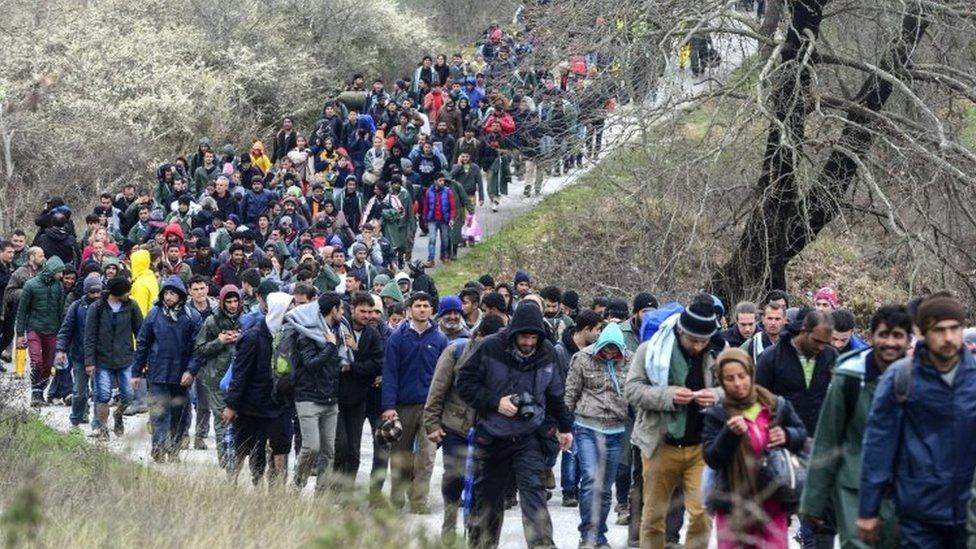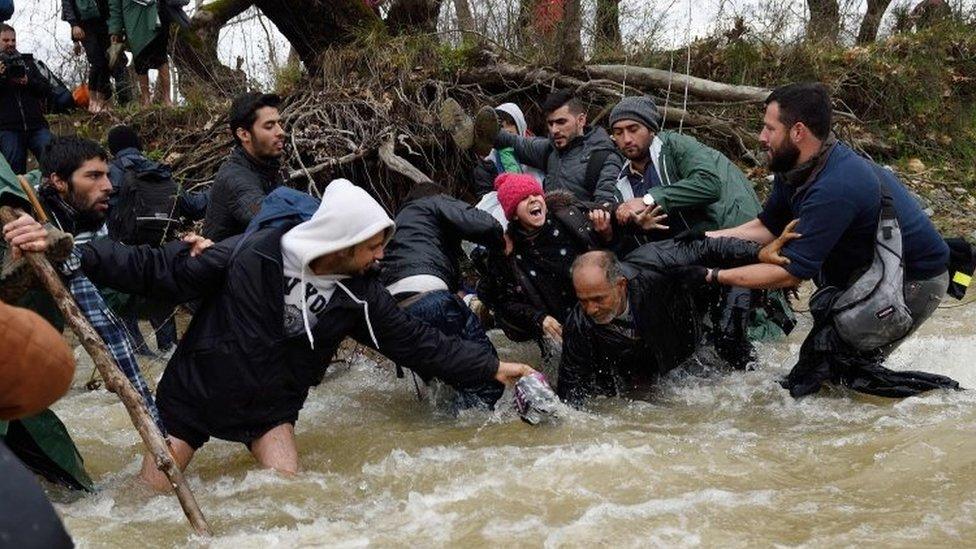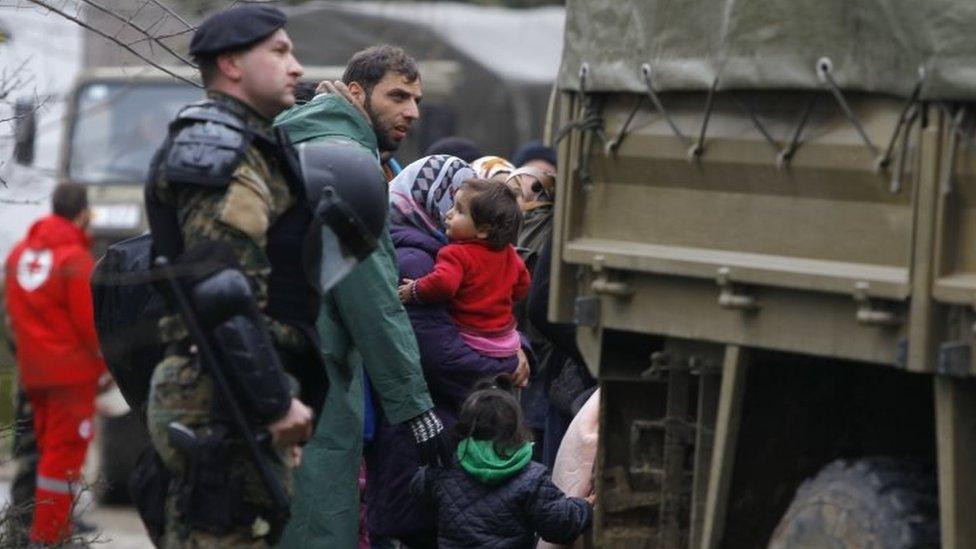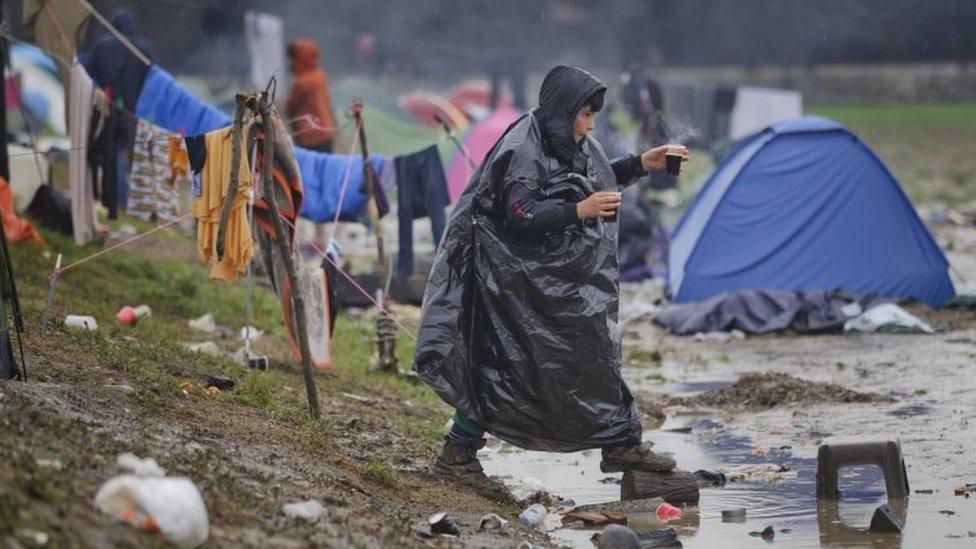Migrant crisis: Hundreds cross from Greece into Macedonia
- Published
Footage shows hundreds of migrants clinging to a rope to cross a fast-flowing river near the border
Hundreds of migrants have crossed from Greece into Macedonia after finding a way through the border fence.
Macedonian police are detaining them, saying they will be returned to Greece.
Earlier, some 1,000 migrants, including children, left their sprawling camp in the Greek village of Idomeni and crossed a river near the border.
About 14,000 people, many from Syria or Iraq, have been stranded at the camp, where conditions have deteriorated following days of rain.
Macedonia last week said it would no longer let any migrants in, blocking the so-called Balkan route north.

Migrants were seen in a long snaking line along a hilly road

Children were carried across the fast flowing river
In other developments on Monday:
Macedonian police say two men and one woman found drowned in the Suva river on Monday were migrants trying to enter the country from Greece
The UN refugee agency (UNHCR) says 19 migrants have been placed in a shelter in Macedonia and three in hospital after crossing the river, AP reports
'Return of chaos'
The migrants - many carrying all their belongings - were seen walking in a long snaking line along a hilly road on Monday. The group included a number of children.
When they reached the river, they passed a rope across it and formed a "human chain" to help each other to get to the other side.
The migrants said they were trying to find a gap in the barbed-wire fence on the border.
"We hope we can cross because we are a lot of people. Our number is big now," 24-year-old Syrian migrant Aziz told AP.
"We don't want to stay here [Idomeni] in that camp, because we are tired of being there," he added.

Macedonian soldiers and police put some of the migrants in army trucks

Conditions at the Idomeni camp have deteriorated following days of heavy rain
Hundreds of migrants later found a gap near the Greek village of Hamilo and crossed into Macedonia.
Macedonian police and soldiers then detained the migrants, putting them in army trucks.
"We are taking measures to return the group to Greece," a Macedonian police spokeswoman was quoted as saying by Reuters.
At least 20 journalists who followed the migrants were also detained, reports say.

Meanwhile, Greek police officer Panos Tenos told the BBC the migrants had been informed during their march that "crossing illegally is a dead end since the borders to reach Central Europe are closed".
"Police forces followed the refugees from Idomeni to Hamilo, and when they tried to block them peacefully the crowd dispersed and it was impossible to stop them," he added.
Local UNHCR representative Babur Baloch told the BBC: "What we are seeing is a return of chaos whenever there's a unilateral decision to close the borders, when there's no co-ordination, when countries in Europe don't coordinate and don't share responsibility, then we see more misery for refugees."
"And that's exactly what we're going through in Greece today. We see more and more people arriving here. There's no way out, Greece is struggling, it needs support from the EU," he added.

Last week, the EU and Turkey set out a plan to ease Europe's biggest refugee crisis since World War Two.
Under the plan, still to be finalised, all migrants arriving in Greece from Turkey would be sent back. For each Syrian returned, a Syrian in Turkey would be resettled in the EU.
Hundreds of thousands of migrants have travelled through Macedonia over the past year, heading north.

What is in the EU-Turkey proposal?
The EU leaders said "bold moves" were needed, and made the following proposals:
All new irregular migrants crossing from Turkey to Greece will be returned to Turkey. Irregular migrants, external means all those outside normal transit procedures, ie without documentation
In exchange for every returned Syrian, one Syrian from Turkey will be resettled in the EU
Plans to ease access to the EU for Turkish citizens will be speeded up, with a view to allowing visa-free travel by June
EU payment of €3bn ($3.3bn; £2.2bn) promised in October will be speeded up, with the possibility of further aid to help Turkey deal with the crisis. Turkey reportedly asked for the sum to be doubled
Preparations will be made for opening new chapters in talks on EU membership for Turkey

A note on terminology: The BBC uses the term migrant to refer to all people on the move who have yet to complete the legal process of claiming asylum. This group includes people fleeing war-torn countries such as Syria, who are likely to be granted refugee status, as well as people who are seeking jobs and better lives, who governments are likely to rule are economic migrants.